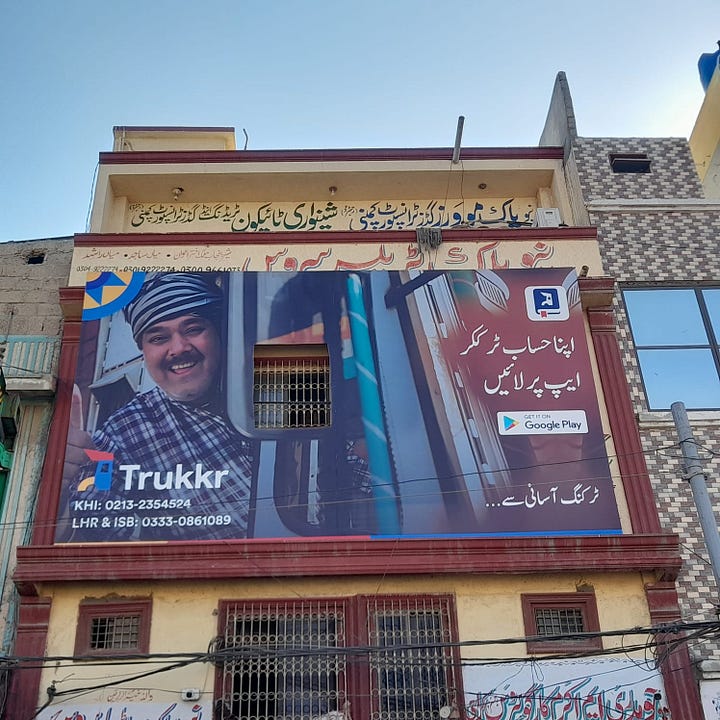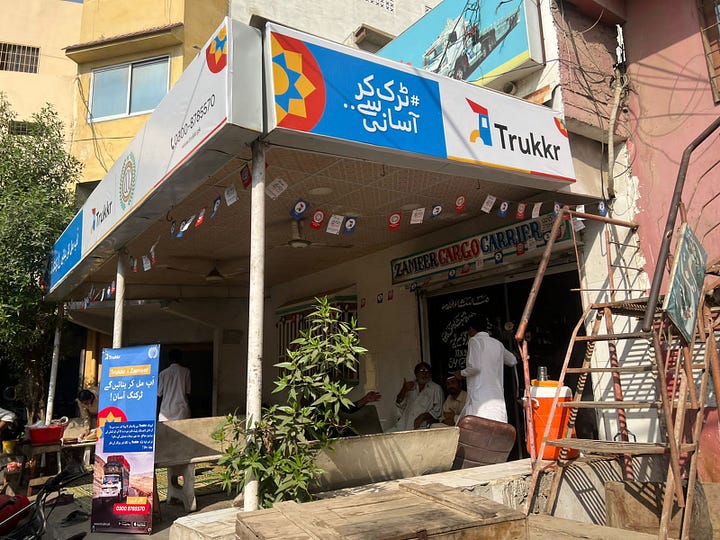7 Questions with the Founder Building the Digital Operating System for Pakistan’s $14B+ Trucking Industry
Digitising MENAP's fastest growing and most fragmented trucking market.
Welcome to the second installment of our new series, "Founders at the Frontier," brought to you by Sturgeon Capital. As we celebrate the successful first close of our latest venture fund and the onboarding of institutional investors such as the International Finance Corporation (IFC) and SBI Holdings, we wanted to take this opportunity to learn from and spotlight the visionary entrepreneurs behind our portfolio companies. These founders are tackling fundamental challenges and driving innovation across frontier and emerging markets, from Uzbekistan and Pakistan to Georgia, Egypt, and beyond. You can find the previous interview, with the founder of Bangladesh’s largest online travel agency and migrant-focused remittances app, here.
—
Trucks are the lifeblood of modern logistics: Just as blood circulates through the body to deliver oxygen and nutrients to organs and tissues, trucks transport goods and raw materials to businesses and consumers, keeping the economy functioning and healthy. Ali Reza Haji, an ex-investment banker and serial founder in the logistics sector, is building the de facto digital operating system for Pakistan’s $14b+ trucking market. This market consists of: 350k+ carriers, 10k+ brokers and 150k+ shippers.
We led an investment in Ali’s company in March 2022. Since then, our excitement about Trukkr’s mission and traction has only gone upwards. This piece is a rapid Q&A with Ali Reza, one of Trukkr’s founders. It covers the logistics market structure in Pakistan, the importance of capital-light business models, the impact of working capital on small trucking companies, and the chance to apply data to unlock the full stack of insurance, financing, and more for the trucking industry. Let’s start our learning journey.
Before Trukkr
Krish: Let’s start before Trukkr. Can you share a bit about your journey building a logistics company and learning about the import-export supply chain business in Pakistan?
Ali Reza: My co-founder Shehryar and I studied together at Columbia and worked in financial services in New York and London after college. In 2012, Shehryar called me and said he was moving back to Pakistan to work in logistics. Supply chains are essential in all parts of life, from shipping, ports, clearing, to trucking.
We did different parts of logistics like warehousing, shifting goods from factories to warehouses, and distribution to retailers. This allowed us to understand the breadth of the market. In 2019, we realized Pakistan was ready for digitization in the supply chain space.
We also interacted with many small owner-operators, as Pakistan's trucking space is very fragmented. It became clear there was an opportunity to create a trusted institution that could become a logistics bank for this underserved market by combining our logistics and financial services experience to give them access to supply chain financing.
Using Data to Unlock New Financial Instruments
Krish: What concrete impact has this financing had on customers so far?
Ali Reza: The data shows that the revenue and income transporters can earn increases significantly with access to working capital. For example, a transporter has to pay for fuel, maintenance, and the driver upfront while waiting 30-90 days to get paid by corporates. Often the vehicle remains idle until payment comes in.
Access to working capital allows asset utilization to improve, directly impacting revenue and profitability. It empowers them to generate upto 25% more revenue and uplifts their lifestyle. Having access to working capital at reasonable rates allows them to utilize assets significantly better.
Market Structure of Trucking in Pakistan:
Krish: What is the broader market structure of trucking logistics in Pakistan right now?
Ali Reza: Pakistan is unique in that there's one main port in Karachi. Rail networks and waterways are not well-maintained, so almost everything moves on trucks, whether it's imports moving inland or exports out of Karachi.
The market is highly fragmented. The organized space, meaning companies with 100+ trucks, is less than 10% of the roughly 400,000 total trucks. Over 90% are small owner-operators, often passed down through generations - micro-entrepreneurs essentially. Our job is to give them access to financing to grow their business while making a spread ourselves.
Krish: It seems like you're consolidating a fragmented market through a technology layer rather than buying up small entities. What are your thoughts on this approach versus traditional consolidation?
Ali Reza: Buying up small transporters in a roll-up strategy would be very complicated, likely not even feasible. These owner-operators take pride in their vehicles and want to own more over time. That's the journey we want to support them on.
We've already had 25-30,000 transporters participate on our platform with limited marketing, largely through word-of-mouth. The adoption has been powerful - people literally walk into our office asking for loans to be added to the platform.
For us, getting access to data is key. It allows us to lend effectively and do credit analysis efficiently. This product-market fit, where business comes to us on an inbound basis, has been a major reason for our success. It's about meeting the need smartly and using technology to do it efficiently.
Data and Creating New Financial Products for the Trucking Industry in Pakistan
Krish: How do you think about building out additional financial services beyond your current working capital and asset finance products?
Ali Reza: Insurance, both for vehicles and cargo, is a natural additional product that can be layered on, especially as we build out asset financing. It's a known commodity in insurtech globally.
Customer education will be important, similar to what we've done on the lending side. The word-of-mouth effect then takes on a life of its own. Insurance companies have already approached us, seeing the potential in this target audience that has historically been ambivalent about insurance.
There is potential for partnerships where we can get a transaction fee rather than selling the insurance directly. As you noted, our position and customer relationships put us in a strong place to add this when the time is right.
Krish: Have you studied other parts of Pakistan's logistics value chain? Any unique market insights to share?
Ali Reza: One big picture insight is that our platform allows us to see economic activity as a whole. We can tell if goods are still moving or at a standstill, giving us a first-mover view on the ground regardless of macro events.
Within the supply chain, warehousing is a big element that other players specialize in. We've explored lending to the shipping and freight forwarding space. During COVID, container deposit financing became interesting due to container shortages.
So there are niches to explore and you have to be flexible to try new things as opportunities emerge. Our aim is to increase transporters' profitability and asset utilization through working capital rather than optimizing for low margins.
Competition and Collaboration:
Krish: How do you think about competition and collaboration in the logistics ecosystem?
Ali Reza: In 2021-22, there was a flurry of trucking marketplaces that heavily discounted trips, causing huge uproar and dislocation in the market. It was painful for traditional transporters to work on lower margins to get business.
But we've seen rationality return to the market. While it's a demand-supply driven market, those dynamics have remained reasonably stable. One potential near-term change is stricter regulation on truck axle loads to prevent road damage from overloading.
This would require multiple trips to supply the same amount of goods, in turn increasing revenue and asset utilization for the transport sector. We work closely with regulators who have been quite business-friendly and proactive.
While we don't directly influence transport regulation today, our network gives us a good view of market trends, allowing us to potentially adjust or create new products to cater to them.
Inspirations and Longer Term Visions
Krish: Which entrepreneurs and companies in Pakistan do you find most interesting right now?
Ali Reza: Any startup that has managed to survive and thrive in the last 6-12 months, and continues to do so in the coming 12 months, has my respect. It's a tough environment and I think we got a bit ahead of ourselves, similar to the rest of the world. But the opportunity is huge.
There's also a real opportunity for us and others to expand into other regions, leveraging our learning, data, and access to very talented, low-cost labor. This allows us to compete and be active in regional markets.
Krish: What is your longer-term 10+ year vision for Trukkr?
Ali Reza: I'd love to see us become a regional player. We've spent time in certain regions and have investors with strong networks there. If we're sitting here chatting 10 years from now, I would definitely expect to have grown regionally and become a major player in the space. I look forward to the new frontiers ahead and would love to tackle them together.
To help the reader get a better *feel* for Trukkr’s operations, here are some select images that we liked:




Finally, if you’d like to learn more about Trukkr, we’re hosting an exclusive Q&A with the founder, where we’ll dig deeper into the stories and lessons from Trukkr thus far. This is a private event for individuals in our SPV/co-investment network. If you’d like to join either the network, or the event, feel free to sign up here.




